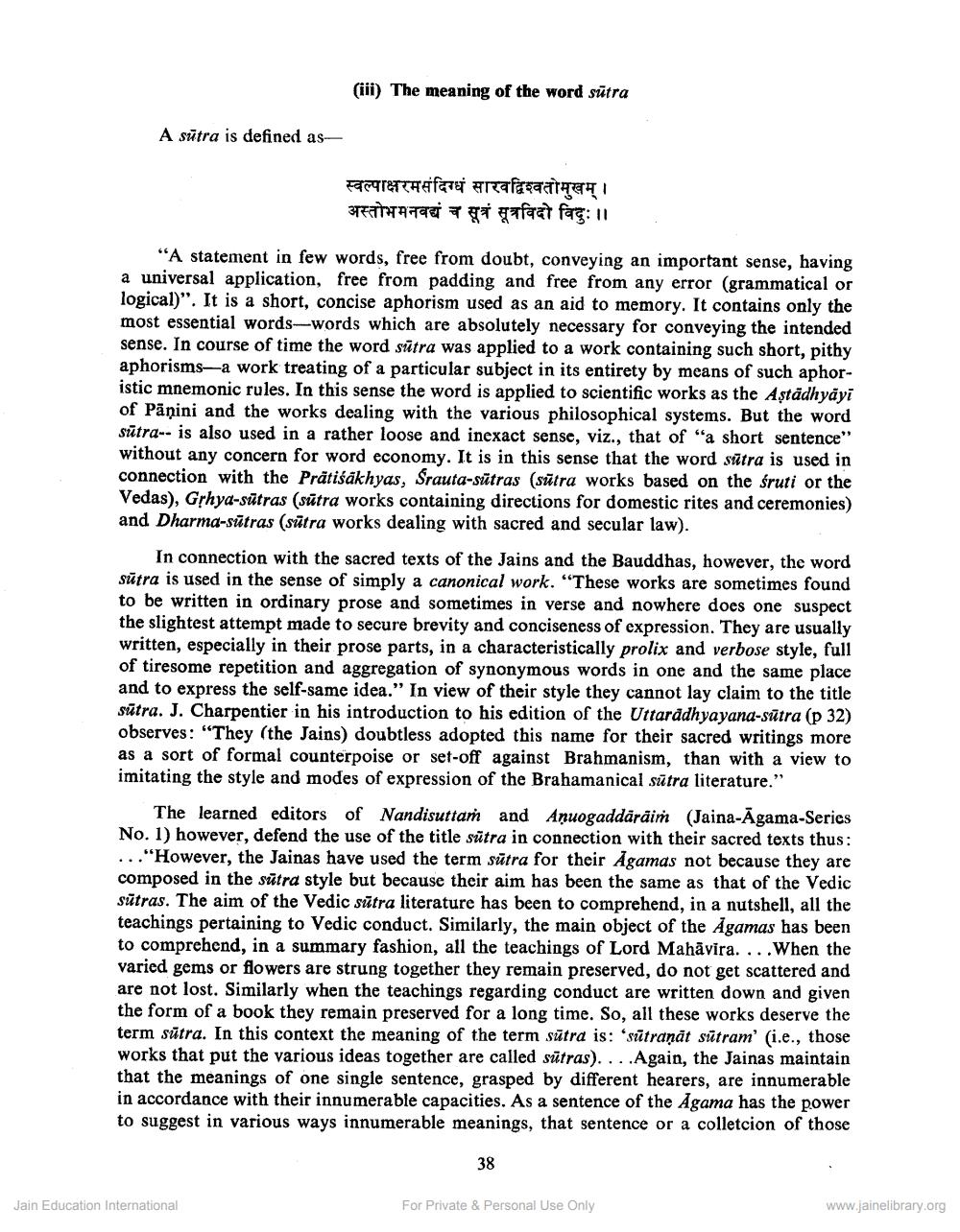________________
(iii) The meaning of the word sutra
A sūtra is defined as
स्वल्पाक्षरमसंदिग्धं सारवद्विश्वतोमुखम् । अस्तोभमनवद्यं च सूत्रं सूत्रविदो विदुः।।
"A statement in few words, free from doubt, conveying an important sense, having a universal application, free from padding and free from any error (grammatical or logical)". It is a short, concise aphorism used as an aid to memory. It contains only the most essential words-words which are absolutely necessary for conveying the intended sense. In course of time the word sūtra was applied to a work containing such short, pithy aphorisms—a work treating of a particular subject in its entirety by means of such aphoristic mnemonic rules. In this sense the word is applied to scientific works as the Aştädhyayi of Pāņini and the works dealing with the various philosophical systems. But the word sūtra-- is also used in a rather loose and inexact sense, viz., that of "a short sentence" without any concern for word economy. It is in this sense that the word sūtra is used in connection with the Prätiśākhyas, Srauta-sütras (sūtra works based on the śruti or the Vedas), Grhya-sūtras (sūtra works containing directions for domestic rites and ceremonies) and Dharma-sútras (sūtra works dealing with sacred and secular law).
In connection with the sacred texts of the Jains and the Bauddhas, however, the word sutra is used in the sense of simply a canonical work. "These works are sometimes found to be written in ordinary prose and sometimes in verse and nowhere does one suspect the slightest attempt made to secure brevity and conciseness of expression. They are usually written, especially in their prose parts, in a characteristically prolix and verbose style, full of tiresome repetition and aggregation of synonymous words in one and the same place and to express the self-same idea." In view of their style they cannot lay claim to the title sūtra. J. Charpentier in his introduction to his edition of the Uttaradhyayana-sūtra (p 32) observes: "They (the Jains) doubtless adopted this name for their sacred writings more as a sort of formal counterpoise or set-off against Brahmanism, than with a view to imitating the style and modes of expression of the Brahamanical sūtra literature."
The learned editors of Nandisuttaṁ and Anuogaddaraiṁ (Jaina-āgama-Series No. 1) however, defend the use of the title sūtra in connection with their sacred texts thus: ... "However, the Jainas have used the term sūtra for their Agamas not because they are composed in the sūtra style but because their aim has been the same as that of the Vedic sūtras. The aim of the Vedic sūtra literature has been to comprehend, in a nutshell, all the teachings pertaining to Vedic conduct. Similarly, the main object of the Agamas has been to comprehend, in a summary fashion, all the teachings of Lord Mahāvira. . . . When the varied gems or flowers are strung together they remain preserved, do not get scattered and are not lost. Similarly when the teachings regarding conduct are written down and given the form of a book they remain preserved for a long time. So, all these works deserve the term sūtra. In this context the meaning of the term sūtra is: 'sūtraņāt sūtram (i.e., those works that put the various ideas together are called sūtras). ...Again, the Jainas maintain that the meanings of one single sentence, grasped by different hearers, are innumerable in accordance with their innumerable capacities. As a sentence of the Agama has the power to suggest in various ways innumerable meanings, that sentence or a colletcion of those
38
Jain Education International
For Private & Personal Use Only
www.jainelibrary.org




